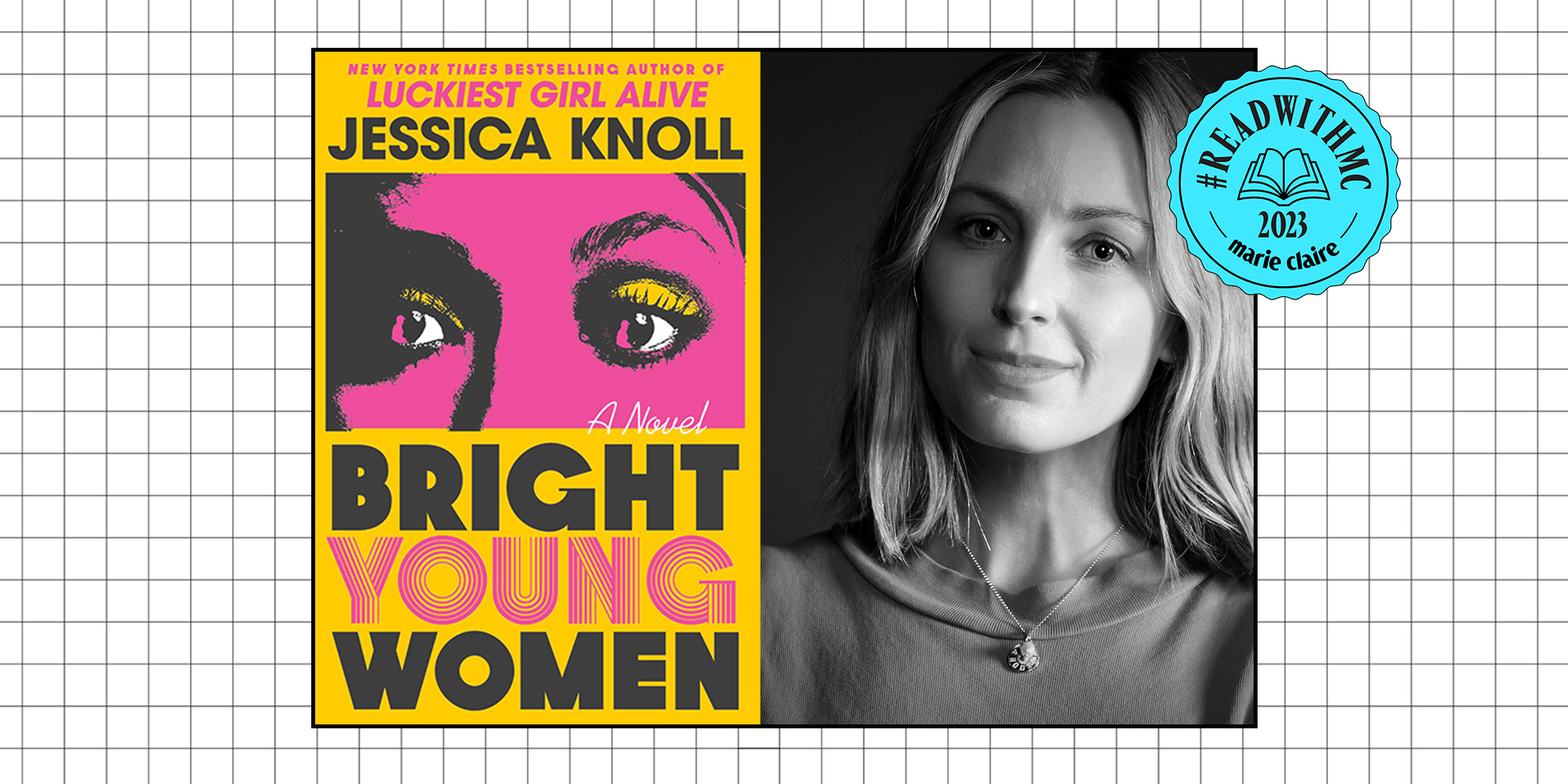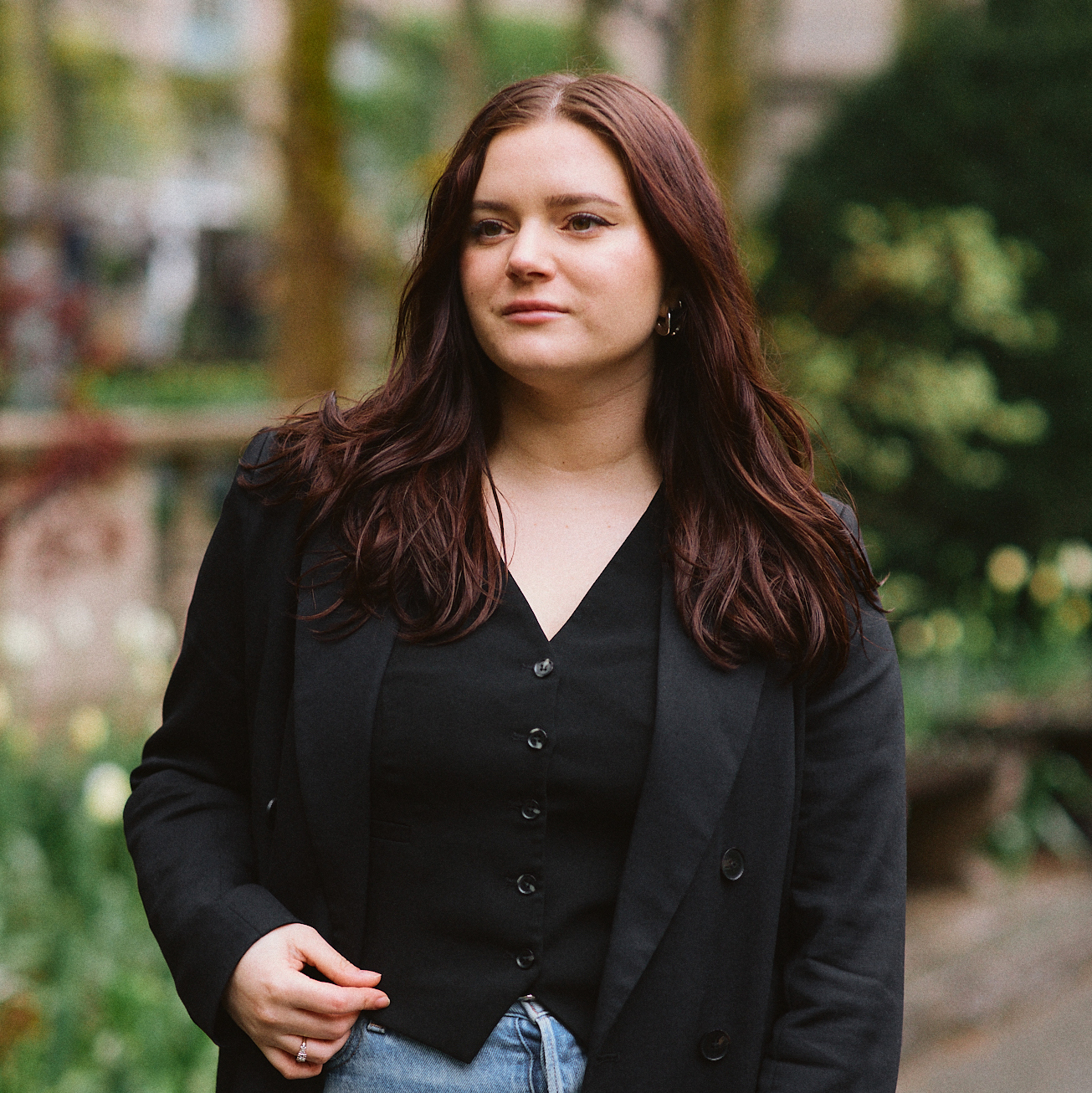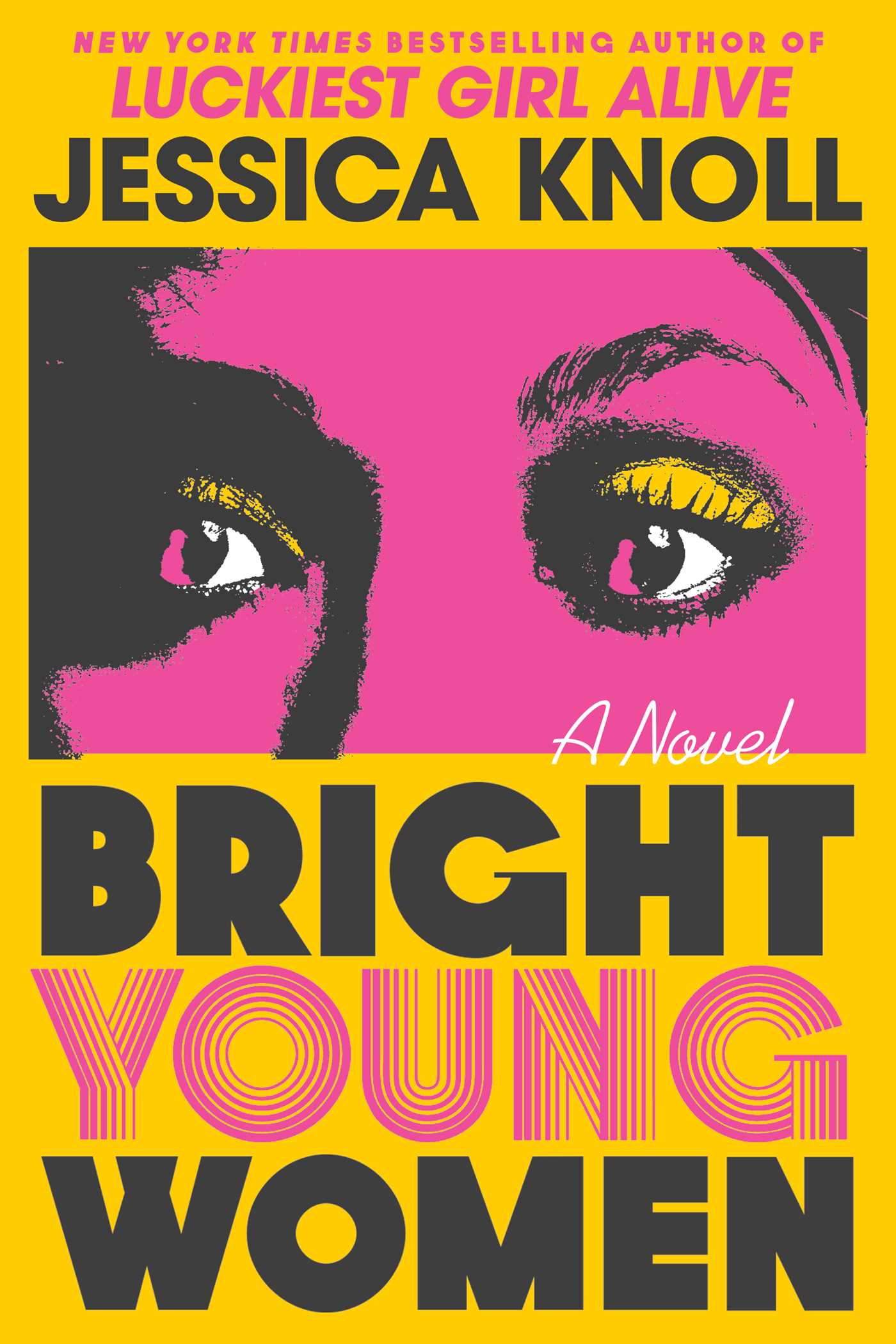'Bright Young Women' Is Our October Book Club Pick
Read an excerpt of Jessica Knoll's new book, here, then dive in with us throughout the month.


Welcome to #ReadWithMC—Marie Claire's virtual book club. It's nice to have you! In October, we're reading Jessica Knoll's Bright Young Women, a novel that reimagines the story of Ted Bundy by placing the women who died by his hand front and center. Read an excerpt from the book below, then find out how to participate. (You really don't have to leave your couch!)
Henry Pearl met me in the parking lot at the Leon County Jail. He was younger than I’d pictured over the phone, with a blond mustache and a peaches-and-cream complexion that was splotchy in the Florida humidity. He thanked me loudly for being on time, almost as if he wanted someone else to hear. A quick survey of my surroundings revealed a young woman smoking on the curb wearing heavy tortoiseshell sunglasses that would leave purplish indents on either side of her nose for the next few hours. She had black, ironed-straight hair and a tiny hourglass figure buttoned up snugly in a plaid suit. This was Veronica Ramira, thirty-two, the sole strategic female on The Defendant’s defense team. I despised her and wanted her to like me on the spot.
“Hello, Henry,” she said, pronouncing his name Enri. Later, in her closing remarks, Veronica would tell the twelve jurors that she arrived in Miami as part of the first wave of Cubans after the revolution, a twelve-year-old girl who barely spoke English, with parents who no longer had a cent to their name. When she spoke about the pain of being persecuted for something for which you bore no responsibility, her hand lightly resting on The Defendant’s shoulder, her voice carried considerable weight.
We walked past her into the jail and ended up waiting nearly an hour to be called back into the interrogation room. The Defendant did not like to be told what to do and when to do it and once jammed his jail cell keyhole with toilet paper so the guards couldn’t get in when they arrived to escort him to his arraignment. For this he was called cunning and clever, though I had a dog who also tore up toilet paper when he didn’t get enough attention.
The Defendant came into the dreary cement-walled interrogation room shuffling papers and sighing and apologizing, as though he’d had to rush across town from another important meeting to make this one. Quite the performance from a man who had taken a supervised shower that morning.
He sat down and avoided eye contact until the guard removed the shackles from around his wrists. Only then did he flash me an empathetic, mischievous smile, a smile that said neither of us belonged here, and wasn’t this just a monumental drag on the pair of us? Two fine upstanding citizens with nice looks and respectable backgrounds. Then he was touching temples with Veronica Ramira, murmuring and indicating an underlined passage in one of his documents. “I recall,” she said to him. There were greetings on either side of the table that were far too pleasant for my taste. The bailiff brought in the Bible, and the court reporter swore to the certification of the proceedings.
“Do you understand what it is we’re doing today?” The Defendant asked me slowly, chivalrously, as though he was happy to spell things out for the sorority bimbo across from him. He was wearing the oatmeal-colored suit from my premonition, and I was overcome with a powerful sense of reassurance. I’d seen him coming.
Stay In The Know
Get exclusive access to fashion and beauty trends, hot-off-the-press celebrity news, and more.
“I’ve sat in on a few depositions for one of my classes at Columbia,” I answered with a lofty lift of my chin.
The Defendant’s face fractured terrifyingly with smile lines. “Then you should know it’s best to answer with a simple yes or no.”
“At Columbia, they teach you to frame the answers in favorable terms.” I shrugged, unperturbed. Must be an Ivy League thing. “But yes, I understand the nature of today’s proceedings.”
“Thank you,” he said. Absentmindedly, he rolled his notes into a tube and, while we spoke, choked it with small hands, eyes drifting to my throat.
“Please state your address for me.” His arousal, that the power of the state gave him the authority to ask this of me, was unmissable— he adjusted himself in his seat, rubbed his lips together wetly.
“One-one-two-four Amsterdam Avenue. New York, New York.”
“What is your occupation?”
“I’m a student at Columbia Law School.”
“But it’s only your first year, correct?” The Defendant was quick to clarify. Veronica Ramira scribbled something, shielded it with her hand, and pushed it toward her client. I knew what she’d written without needing to read it. Name. The Defendant was so eager to find out where I lived, to minimize my qualifications, that he’d forgotten to ask my name, which is how you’re taught to begin proceedings at any law school worth its salt.
“I am a first-year student at Columbia Law,” I said. Columbia, Columbia, Columbia. Ask me again about my occupation, you verifiable loser. This was all I could batter him with; this was my oak club.
“Please state your name for the record.”
“Pamela Schumacher.”
“All right,” The Defendant said, unrolling the papers standing in for my elitist-bitch neck, “I’m going to ask you some general questions about the timeline of that morning. After you saw an intruder at the front door, what did you do?”
It was the obvious place to start. “I went upstairs to talk to Denise Andora.” I steeled myself for the follow-up question—why her, of all people? Which would force me to acknowledge my initial, mazed logic. That it was Roger I’d seen ducking out after Denise had smuggled him upstairs.
“Did you encounter someone else before you got to her bedroom?”
“Oh, uh,” I stumbled. Were we really going to gloss over the weakest part of my testimony? “Yes. I did.”
“Who was that?”
“Jill Hoffman.”
“And what was Jill Hoffman doing?”
“She was coming out of her room and heading for the bathroom.”
“Did she have her back to you, or was she coming toward you?”
“She had her back toward me,” I said, more confused than ever. What did that matter?
“Did you call out to her?”
“Yes.”
“What happened then?”
“She turned around, and I could see that there was some blood on her face and hands.”
“Some blood?”
I looked to Mr. Pearl, aghast.
“Please clarify that question for my client,” Mr. Pearl instructed.
“In your statement to the police”—The Defendant shuffled his notes like a deck of cards—“you described it as ‘more blood than I’d ever seen in my life.’ ” But the page in his hand was upside down. Inwardly, I recoiled. The barnyard animal sitting much too close to me had memorized that part.
“For someone like me,” I replied priggishly, “who spends most of her time in the library, yes, it was certainly more blood than I’ve ever seen in my life.”
“Please answer the question.”
Blithely, “Was there one?”
“Was it a lot of blood or only some blood?”
“It was a lot.”
His act was so transparent, his character so fundamentally hollow, that it should have been an affront to the court, a place that was venerated and inviolable to me.
There was a purse of his lips, like an air kiss. In that moment I understood. This was all he wanted: to relive it. There was no trapdoor beneath my feet, at least none The Defendant had the pull cord to. He had summoned me here to tweeze the goriest bits from my memory. I could not believe anyone could call him intelligent, or even take him seriously. His act was so transparent, his character so fundamentally hollow, that it should have been an affront to the court, a place that was venerated and inviolable to me.
“What did you do after you saw that Jill was covered in a lot of blood?” he continued to no objection. There was none to make. This was all legal. Unbelievably legal.
“I ran down the hallway to wake up the other girls.”
“Did you go into Denise Andora’s room then?”
Her name, in his mouth, sounded all wrong. Denise Patrick Andora was a denomination that warranted a reverent inflection. Salvador Dalí had sent her mother a condolence card after she died. When you fry, I willed my pleasant features to express, your mother will have to grieve in societal exile.
“Yes,” I said. “I went to check on Denise Andora then. I loved her. So many people did.” In death penalty cases, copies of court transcripts must be saved forever, and I wanted a permanent record of this unsparing truth, for Denise. “I was worried because she wasn’t out in the hallway with the other girls.”
“Can you describe her physical state when you found her?” There was a quick dart of his lizard tongue, dabbing his thin lips.
“Her eyes were closed, and I thought she was sleeping.”
“Did you notice anything out of place in her room?”
“The window was shut, and she had the covers pulled up. Denise ran hot, so that was unusual for her.”
“Anything else?”
“I don’t understand your question,” I said stubbornly.
“From your police statement”—The Defendant smacked his lips together lasciviously—“ ‘The nozzle of the hair mist bottle was covered in blood and sort of dark brown gunk and hair.’ Do you recall saying that to Detective Pickell?”
I zipped up my knees, pelvis torching with sympathy pains. “I do.”
“Can you describe the hair mist bottle?”
“What does he mean?” I asked Veronica Ramira, whispering a little. I could see in her face that I’d shocked her, but I was realizing that about the only time The Defendant didn’t scare me was when I was in the same room he was. When I could confirm the exact location of his whereabouts with my own two eyes, and there were guards with guns who would put a bullet in his middling brain if he so much as breathed wrong. If I wanted to make him feel like scum on the bottom of my shoe, this would be my only chance.
“What is your understanding now as to why the nozzle of the Clairol hair mist bottle was covered in those elements?” The Defendant hastened to ask before Veronica Ramira could get involved.
I bit my tongue as Veronica Ramira leaned across her client, head bent to block his face, and whispered something. For a moment I thought she was resigning as counsel, having remembered she was a woman.
“I apologize,” she said to me. “I need to use the ladies’ room.”
We took a break, and when we came back into the concrete room, Veronica Ramira took over the interview and destroyed my unimpeachable testimony in ten brisk minutes.
“Going back to the conversation you had with Bernadette Daly in the early-morning hours of January fifteenth,” she began, “do you recall telling her that you thought you saw Roger Yul at the front door?”
“I said that was an initial reaction when I first saw someone, because Roger was around a lot, and because they are both on the small side.” I enjoyed suggesting to his face that The Defendant was a small man.
“And Roger Yul was Denise’s steady boyfriend?”
“He was. But not by then. They’d broken up before the break.”
“Did anyone else at the sorority ever date him?”
Panic roused with a guard dog’s growl. Veronica Ramira, unlike The Defendant, had actually graduated from law school and passed the bar. She wasn’t here for cheap thrills; she was here to win her case. “Yes. Bernadette Daly.”
“How long did they date?”
“I believe it was just the one time they went out.”
“And what did they do, that time they went out?”
Sweat beaded at my bra line, but I kept my face placid. “She said they went to see a movie.”
“What about after the movie, in his car?” Veronica Ramira put a slight emphasis on car. She knew. “Did Bernadette talk to you about something that happened in Roger’s car?”
My head roared with blood. Carl and Tina were the only two people on earth who knew what Roger did to Bernadette. And if Carl was trying to win The Defendant’s affections, wouldn’t this be exactly the sort of information he would offer up to The Defendant, as proof that there was someone else capable of the attack on The House?
“In confidence,” I said, bristling, “she did.”
“We are way past worrying about the bonds of sisterhood at the sorority house,” Veronica Ramira said in this infuriating hate to break it to you tone, as though I were the reason we were here, airing all our private and personal matters. “What did Bernadette say happened with Roger?”
I supposed I had no right to be furious with Carl for leaking this to the defense. It was like leaving the trash out and blaming the racoons for getting into it. Carl Wallace was just doing what every member of the rodent-faced press did back then.
“She said that Roger pushed her head into his lap.”
“To perform oral sex, isn’t that correct?”
My neck flushed violently. “Yes.”
“Did Bernadette say how she felt about that?”
It was like being strapped into a speeding vehicle with my hands tied to the wheel and a brick on the gas pedal. I could see the point of impact drawing nearer, and yet I could not turn or slow down. The impact would be unavoidable and deadly.
“She said she was scared and that she didn’t want to,” I answered helplessly.
“What was she scared of?”
“She couldn’t breathe. She was scared Roger would accidentally kill her.”
“Did you also have a frightening experience with Roger in January 1978, approximately one week after Robbie and Denise were killed?”
“Yes.”
“What happened there?”
“He jumped behind the wheel of the car when I was in the passenger seat and drove off without my consent.”
“And for that, you pressed charges against him, didn’t you?”
“Yes.”
“Aggravated kidnapping charges. Of which he was convicted last fall, correct?”
“Correct.”
“You had the choice not to press charges, and yet you did. How come?”
The answer was the base of the tree, coming at me one hundred miles an hour. “Because I thought he was dangerous and should be behind bars.”
“I have nothing further.” Veronica Ramira turned to The Defendant, who in just a few short months would be described by the New York Times as a “terrific-looking man with light brown hair and blue eyes, rather Kennedyesque.” That was on the heels of the Miami Herald asking Is Quiet, Bright Student a Mass Killer? Though any flashes of brilliance in that bleak room emanated directly from Veronica Ramira, no one wanted to remember it that way.
“I have no more questions,” The Defendant concluded with a parasitic smile, looking tremendously self-satisfied for doing fuck all but attach himself to a woman who was good at her job.
Excerpted from BRIGHT YOUNG WOMEN: A Novel. Copyright © 2023, Jessica Knoll. Reproduced by permission of Marysue Rucci Books, an imprint of Simon & Schuster. All rights reserved.

Brooke Knappenberger is the Associate Commerce Editor at Marie Claire, where she specializes in crafting shopping stories—from sales content to buying guides that span every vertical on the site. She also oversees holiday coverage with an emphasis on gifting guides as well as Power Pick, our monthly column on the items that power the lives of MC’s editors. She also tackled shopping content as Marie Claire's Editorial Fellow prior to her role as Associate Commerce Editor.
She has over three years of experience writing on fashion, beauty, and entertainment and her work has appeared on Looper, NickiSwift, The Sun US, and Vox Magazine of Columbia, Missouri. Brooke obtained her Bachelor's Degree in Journalism from the University of Missouri’s School of Journalism with an emphasis on Magazine Editing and has a minor in Textile and Apparel Management.
-
 Jennifer Lopez's Free People Shout-Out Is Going Viral
Jennifer Lopez's Free People Shout-Out Is Going ViralBut not for the reasons you'd expect.
By Halie LeSavage
-
 James Middleton Shares Why He Was "Breathless and Flustered" During Meeting With Queen Elizabeth
James Middleton Shares Why He Was "Breathless and Flustered" During Meeting With Queen Elizabeth"I heard a snort of laughter and looked past the Queen to see everyone in the room stifling their giggles."
By Kristin Contino
-
 This Modern Princess Will Break a 600-Year-Old Tradition When She Takes the Throne
This Modern Princess Will Break a 600-Year-Old Tradition When She Takes the ThronePrincess Ingrid Alexandra of Norway will follow in a long-ago ruler's footsteps.
By Kristin Contino
